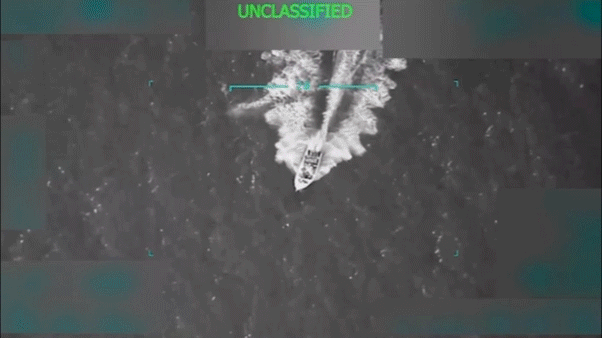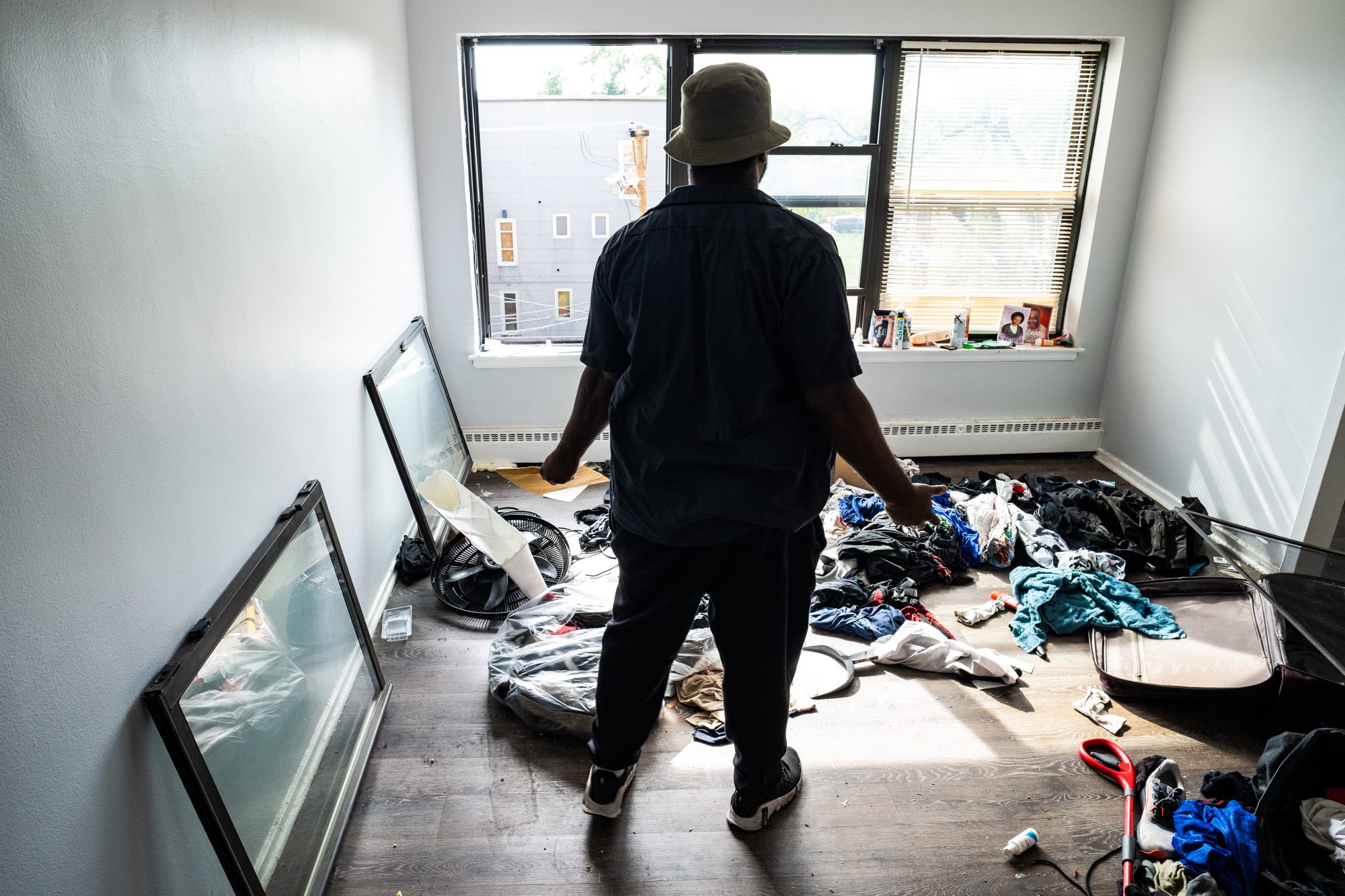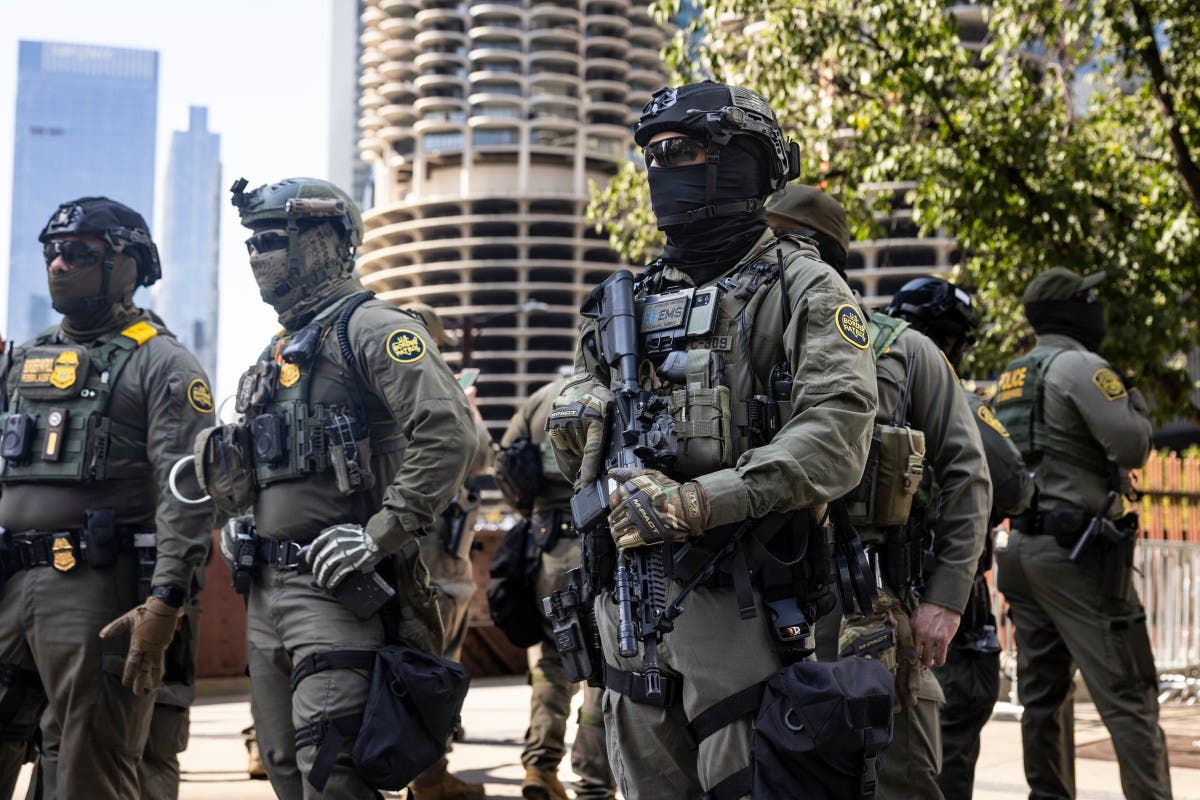He’s an Army veteran now retired after three decades working for the U.S. Postal Service.
Federal agents pounded on the door of his South Shore apartment about 2 a.m. Tuesday.
“I told them they must have the wrong apartment,” the man said.
But armed agents busted open many doors after arriving in U-Haul trucks to raid the 130-unit apartment building at 7500 S. South Shore Drive. They woke up residents to handcuff them with zip ties and led them into unmarked vans.
Rodrick Johnson, a U.S. citizen, said he heard “people dropping on the roof” before FBI agents kicked in his door. He was stuffed inside a van with his neighbors for what felt like several hours until agents told them the building was clear, he said.
“They didn’t tell me why I was being detained,” Johnson said. “They left people’s doors open, firearms, money, whatever, right there in the open.”
A Department of Homeland Security spokesperson said federal agencies arrested at least 37 people in the operation at the building, which they claimed is frequented by members of Venezulan gang Tren de Aragua. About 300 federal agents, some landing on the roof from helicopters, descended upon the building, according to NewsNation, which was invited along for the operation.
The report didn’t mention women and children appear to be among the detained, said Brandon Lee, a spokesman with the Illinois Coalition for Immigrant and Refugee Rights. Organizers worry many people were taken without warrants.
“These were families with their children escorted out in the middle of the night,” Lee said. “This administration is using PR efforts to try to turn communities against their neighbors.”
Residents said the building had become home to Venezuelan migrants. The raid saw people’s apartments turned upside down, citizens held for hours and their neighbors taken away to unknown places. Belongings were stolen from apartments after the agents left the building open.
The Army veteran, who went blind recently and asked not use his name, said the agents moved on to the next apartment after coming to his home.
“I was trying to protect myself,” he said. “My nerves were shook.”
By Wednesday afternoon, the building appeared largely abandoned by residents.
Unsigned waivers allowing DHS to disclose “records about you to a third party” were on front gates near “Know Your Rights” flyers. Broken windows scattered the property. Anyone could just walk in.
Dan Jones stood outside with police officers to file a report after his valuables — from his mattress and iPad down to his air fryer — were stolen after agents broke his door.
Jones slept at an aunt’s house following the raid and returned to find clothing and garbage that wasn’t his all over his apartment floor.
A small moving crew said they had been hired after the raid to clear out now-vacant units — but didn’t say by who. Doors were boarded up. In one room, there were zip ties and blood stains on the floor next to baby shoes. Flies swarmed around open fridges.
Water damage had caved in ceilings. Strollers and air conditioners and more things left behind blocked the middle of dark hallways. The lobby elevators were broken, with their buttons perpetually lit on the down arrow.
There was a strong odor everywhere.
Jones said the building’s “dirty” conditions predated the raid, but this was the worst he’d seen the place. It was the first of the month and his rent was due.
“It looks like hell,” Jones said. “ICE really just a gang.”
Jones said he’d been cordial with the Venezuelans who moved onto his floor.
“They were cool people,” Jones said. “We took it upon ourselves to at least keep it clean over here.”
Residents said problems at the property started after a new management company was brought on over a year ago. Cleanings became less regular, and two armed security guards were removed, they said.
That led to squatters, Jones said.
The Army veteran was guided through the mess in the lobby Wednesday by a caretaker. He couldn’t see the worst of it. The former postman complained of his mail being routinely stolen — and that he’ll have to keep living in the building as he tries to find somewhere else.
“It was a good place to live when I first got here,” he said.
The building’s ownership traces back to Wisconsin-based investor Trinity Flood, according to public records. Flood is facing a $27 million foreclosure lawsuit for not making loan payments on three South Shore properties she bought for $18 million in 2020, according to The Real Deal.
The city also filed suit in February against Flood’s LLCs for over 15 building code violations at the South Shore Drive property dating back to 2023, seeking that it be put under receivership, according to court records. The building failed its past 14 annual inspections, according to data from the city’s Department of Buildings.
“Building throughout has fire extinguishers that are missing,” city lawyers wrote in its legal complaint. “All stairways are filthy with strong smell of urine.”
Flood could not be reached, and the building’s management company, Strength In Management, did not return requests for comment.
The property was most recently estimated at an under $3 million market value, according to the Cook County Assessor’s Office. An online listing has it up for sale for more than $15 million as part of a “Jackson Park Portfolio” with two other South Shore buildings. The listing agent, Finley Askin, did not return a request for comment.
“Capital improvements to the portfolio consist of updated electric/plumbing, newer windows, on-site laundry, and renovated units,” the listing reads.
A “now renting” sign outside lists a number for Safe Harbor Reality, but agent Curtis Krolak said the company hasn’t managed the property in over two years.
“They never took it down,” Krolak said.
Since June, police have reported multiple gun crimes in the 7400 and 7500 blocks of South South Shore Drive, including two homicides, a shooting and two armed robberies, according to city data.
City crime outlet CWB reported that Jose Coronado-Meza, 25, accused of being a Tren de Aragua member, was charged with murder in June, with officials saying he killed another migrant inside the building.
Jonah Karsh, a community organizer with Metropolitan Tenants Organization, had tried to unionize tenants in August 2024 after a gas leak left some without functional stoves for over a month.
“The conditions were deplorable before the raid and have only deteriorated,” Karsh said. “The management was primarily responsible for failing to maintain the property and security.”
Walls on the building’s second floor were spray-painted with “Venezuela,” but it was unclear when. Many of the floor’s units had broken doors and appeared to be home to young children.
South Shore had been a landing spot for many Venezuelans when tens of thousands of migrants were bused from the southern border to Chicago and other Democrat-led cities.
“People stayed at shelters there and then found apartments,” Lee said.
At one point, migrants who received help through a state rental assistance program were living in the building, Karsh said. That funding was set to run out within months.
Karsh has kept contact with leasing tenants who did not have their doors broken or marked during the raid.
Those residents have since been sent instructions about receiving new keys.
“As of today, all points of entry to the building will be secured,” a Strength in Management employee wrote in an email. “Keys will be delivered to active tenants.”
Jones’ eyes welled with tears as he looked around his destroyed apartment. He wants to move. Rebuilding will be harder.
“My place was nice,” he said.
On his way out, he still tried to close the door.









